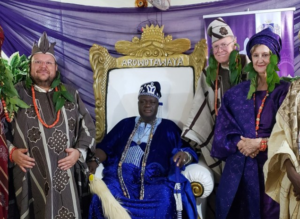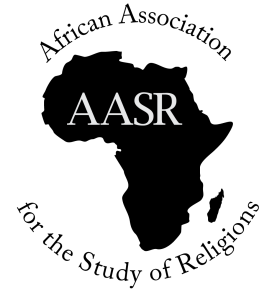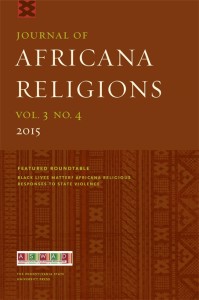2020
Professor Rosalind I.J. Hackett Honoured
Professor Rosalind I.J. Hackett installed Honorary Chief of Erinmoland in Nigeria
By Elias Kifon Bongmba
Professor Hackett

Photo credits: Brent Belnap
The African Association for the Study of Religion congratulates Professor Rosalind I.J. Hackett, University of Tennessee Chancellor’s Professor and Distinguished Professor in the Humanities and Religious Studies, for receiving an Honorary Chieftaincy in Nigeria. The Honorary Chieftaincy was bestowed by His Royal Majesty Oba (Dr) Michael Odunayo Ajayi when he celebrated the fifth anniversary of his coronation as the Elerinmo of Erinmoland, on August 9-10, 2019. At the ceremony of investiture and the celebrations that followed, Hackett and other honorees received the insignia and formal wear befitting their chieftaincy status. She was granted the title of “Yeye Meye of Erinmoland” (Mother who knows our ways).
Hackett was honored for her research and the work she has done for the African Consortium for Law and Religion Studies (ACLARS) for nearly a decade. Hackett is a founding member of ACLARS and serves on its board, as well as playing an active role in planning the highly successful ACLARS conferences in Africa. These annual conferences have created a vibrant forum for African scholars of various disciplines to address critical contemporary issues at the intersection of law, human rights, and religion.
Hackett was pleasantly surprised by this honor and told her colleagues at the University of Tennessee: “It comes at a time in my career when I was taking stock of all the research, teaching, mentoring, and conference planning I have conducted in Africa and beyond over the years. It’s a delight to get this recognition.” Starting from her undergraduate student days in the United Kingdom, Hackett has maintained an abiding presence in Nigeria with more than nine years of research and teaching, making Nigeria her second home. Hackett has done research in more than twelve African countries, spending the most time in Nigeria, Uganda, South Africa, and Ghana. Hackett’s interdisciplinary research has focused on cutting edge issues on African and Indigenous Religions, New Religious Movements, Religion and Art, Conflict and Peace, Religion and Gender, and Religion and Human Rights. Drawing theoretical insights from anthropology, sociology, religious studies methodologies, Hackett has studied and published well-received books and essays on religion and the media, religion and sound, and the growing influence of Pentecostalism in Africa.
Many scholars of Africa and the majority world know Hackett as the person to turn as a mentor in scholarship and the many ways of understanding and interpreting the human condition. Hackett’s work in Northern Uganda built international collaborations that brought together artists and musicians through the Jazz for Justice project. Hackett has served on numerous committees and editorial boards of scholarly journals boards around the world. She is a Past President and Honorary Life Member of the International Association for the History of Religions (IAHR). She currently serves as Vice-President of the International Council for Philosophy and Human Sciences (CIPSH). As members of the African Association for the Study of Religions, we proudly say Hail to the Chief!

Professor Hackett with His Royal Majesty Oba (Dr) Michael Odunayo Ajayi and other honorees, Professor W. Cole Durham Jr. of Brigham Young University and Professor Mark Hill, Queen’s Counsel, of Cardiff University in Wales.
Photo Credits Brent Belnap
Credit: Additional information from Brian Canever, and Addie Morton of the University of Tennessee. https://news.utk.edu/2019/09/16/hackett-receives-honorary-chieftaincy-in-nigeria/
2019
IAHR e-Bulletin Supplement Feb 2019
2019
PhD Studentship, U.of Copenhagen and UEA
Dear Colleagues,
We are pleased to announce (and remind you of) a 3-year PhD studentship hosted by the University of Copenhagen and University of East Anglia.
The studentship is on the broad theme of religion and social change in Africa. More information can be found here: https://bit.ly/2R2pTSz The deadline for applications is February 4th. Please also note that due to funding reasons the studentship is available only to applications from the EU (including the UK).
Best wishes,
Ben Jones (UEA)
Karen Lauterbach (Copenhagen)
2018
Holiday Greetings from AASR President Elias Kifon Bongmba
Dear Colleagues,
I send you holiday greetings on behalf of the Executive of the African Association for the Study of Religions. Thank you for your AASR membership and participation that has made us grow over the years.
2018 has been a fantastic year for us. First, the Biennial Conference held in Lusaka was a great success. I extend our thanks to the University of Zambia and the Justo Mwale University for hosting us. The Co-Chairs of the Local Organizing Committee, Dr. Marja Hinfellar, and Dr. Judith Ziwa and all the members of the committee did a fantastic job in putting together the conference on short notice, and we thank them for this service. We thank the International Association for the History of Religions, IAHR, for the generous support of our Lusaka conference. We also express our appreciation to many of you who presented papers at this conference and invite you to consider presenting papers at the next Biennial Conference that will hold in Senegal in 2020. Our Vice President, Dr. Damaris Parsitau, is in conversation with the Executive Director of the Council for the Development of Social Science Research in Africa (Codesria), and we will give you further updates in the New Year. We encourage you to prepare for that conference as well as the 22nd Quinquennial World Congress of IAHR that will convene at the University of Otago in 2020.
Second, we thank all of you who presented papers at the American Academy of Religion (AAR) and Society for Biblical Literature (SBL) during the annual meeting in Denver, Colorado. In preparation for 2019, we encourage you to send paper and panel proposals when the call for papers goes out. Consider also sending paper and panel proposals for the African Studies Association (ASA).
Third, we want to extend our congratulations to Professor Jacob Kehinde Olupona of Harvard University for receiving the Martin E. Marty Award for the Public Understanding of Religion from the American Academy of Religion. Many of you attended the award ceremony and later joined us for dinner at an Ethiopian Restaurant in Denver to celebrate the accomplishment and leadership of Professor Olupona.
Fourth, we congratulate Professor Gerrie ter Haar for the recognition that she received this year with a Life Time Membership in the International Association for the History of Religions (IAHR).
Fifth, we have signed a memorandum of understanding to collaborate with the Journal of Africana Religions, a peer-reviewed journal edited by Professors Edward E. Curtis and Sylvester A. Johnson and published by The Pennsylvania State University Press. We thank Professors Curtis and Johnson for leading this initiative and encourage you to consider submitting your work to this journal as well as book series that the journal has with the press for consideration. This amazing initiative adds to the journal list we support, including the AASR Ejournal, and the Journal of Religion in Africa.
Sixth, we are exploring opportunities for our web services that includes finding a new host and home. The move to a new hosting service is the first for us and involves a large budget for these services. I encourage all of you to pay your annual membership dues and consider making a generous gift to AASR to facilitate this transition. We have functioned and maintained a presence on the World Wide Web, at no cost at least during my tenure, and we have Professor Jan Platvoet and Professor Melissa Browning and Wes Browning to thank for their dedicated service. They will work with Dr. Sara Fretheim our Web and Social Media specialist to effect this transition. The success of this transition depends on our generosity, and I appeal to all of you to consider making a gift to make this work smoothly so that we do not lose our ability to communicate with all of you.
Thank you.
Sincerely,
Elias Kifon Bongmba
President
2018
Announcing a Partnership with the Journal of Africana Religions!
A letter from our President, Elias K. Bongmba, outlining an exciting new initiative with the Journal of Africana Religions, followed by our joint press release. Read on!
Dear Colleagues of the AASR Community,
The executive of AASR has received, discussed, and approved an invitation from Professor Sylvester Johnson and Professor Edward Curtis, editors of the Journal of African Religions, for the African Association for the Study of Religions to collaborate closely with the Journal of Africana Religions. This is a new chapter for us, but also similar to the ties we have with the Journal of Religion in Africa.The journal also edits a book series in Africana Religions and recent authors who have published in the series include Oludamini Ogunnaike and Adriaan van Klinken. Please do take some time and look at the description of the series here.
We are delighted to tell you that as part of this collaboration, the editors of the journal have informed us that AASR members based in Africa will receive free subscriptions to the journal. Our members who live outside Africa will receive discounted subscription to the journal.
We invite all our members to be part of this expanded intellectual collaboration because it further fulfills one of our goals of strengthening our growing intellectual community in Africa and the African diaspora.
Sincerely,
Elias K. Bongmba
President, AASR
# # # # # FOR IMMEDIATE RELEASE # # # # #
CONTACT:
Sara Fretheim, sara@sarafretheim.com
Edward Curtis, ecurtis4@iupui.edu
RELEASE DATE: November 29, 2018
AFRICAN ASSOCIATION FOR THE STUDY OF RELIGIONS AND JOURNAL OF AFRICANA RELIGIONS ANNOUNCE GROUNDBREAKING PARTNERSHIP
Today the African Association for the Study of the Religions (AASR) and the Journal of Africana Religions announced a multifaceted partnership that will advance the global study of Africana religions.
“This is a new chapter for us,” said AASR President Elias Bongmba, who is the Harry and Hazel Chavanne Chair in Christian Theology at Rice University. “It significantly strengthens our growing intellectual community in Africa and the African diaspora.”
The new partnership’s most ambitious component is the creation of pan-Atlantic research teams that will unite scholars from Africa, the Americas, and Europe for collaborative research and writing. “In some cases,” according to Journal of Africana Religions co-founder and Virginia Tech Humanities Center Director Sylvester Johnson, “these will be mentoring relationships between senior and junior scholars. In other cases, the pairs will be composed of professors of equal rank. Whatever the case, the pairings must be mutually beneficial.”
“If these research pairings work the way we want them to,” added journal co-founder and IUPUI Millennium Chair of the Liberal Arts Edward Curtis, “some of them will lead to joint authorship of book manuscripts that we will want to consider for publication.” In addition to editing the journal, Johnson and Curtis are the editors of a Penn State University Press book series on Africana religions.
Under the new partnership agreement, AASR will become a Journal of Africana Religions sponsor, and AASR members working in Africa will receive complimentary e-subscriptions to the journal.
The Journal of Africana Religions will also play a role at the 9th AASR conference in Dakar, Senegal, in 2020.
Both groups plan on supporting one another’s social media and communications strategies, too.
Founded in 1992 in Harare, Zimbabwe, the AASR promotes the study of religions in Africa through international collaboration in research, publishing, and teaching. AASR is an affiliate organization of the International Association for the History of Religions. It provides a scholarly network for scholars across the African continent, Europe, and North America through its conferences in Africa, its bulletin, its own e-journal on African and African diasporic religions, and annual meetings at the American Academy of Religion and African Studies Association. It also supports the Journal of Religion in Africa.
The Journal of Africana Religions is a peer-reviewed journal that features research on the diverse religious heritage of African and African-descended people. Now in its seventh volume, the journal, which is published by Penn State University Press, is available from Project Muse and JSTOR as well as in print. It is also sponsored by the Association for the Study of the Worldwide African Diaspora (ASWAD).
Both organizations emphasized that their new cooperation will complement rather than compete with existing partnerships and initiatives. The purpose is to increase resources devoted to the growth of the field in order to reflect its critical importance to the future of human knowledge-making.
# # # # # # # # # # #


